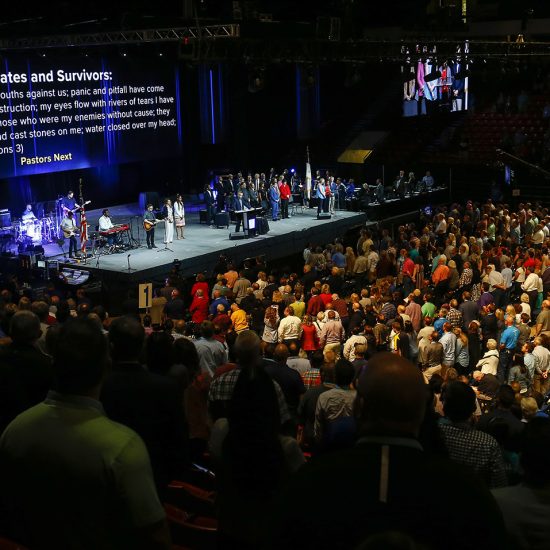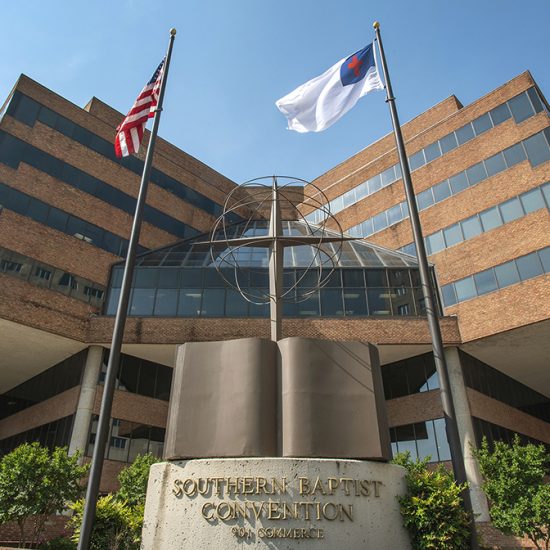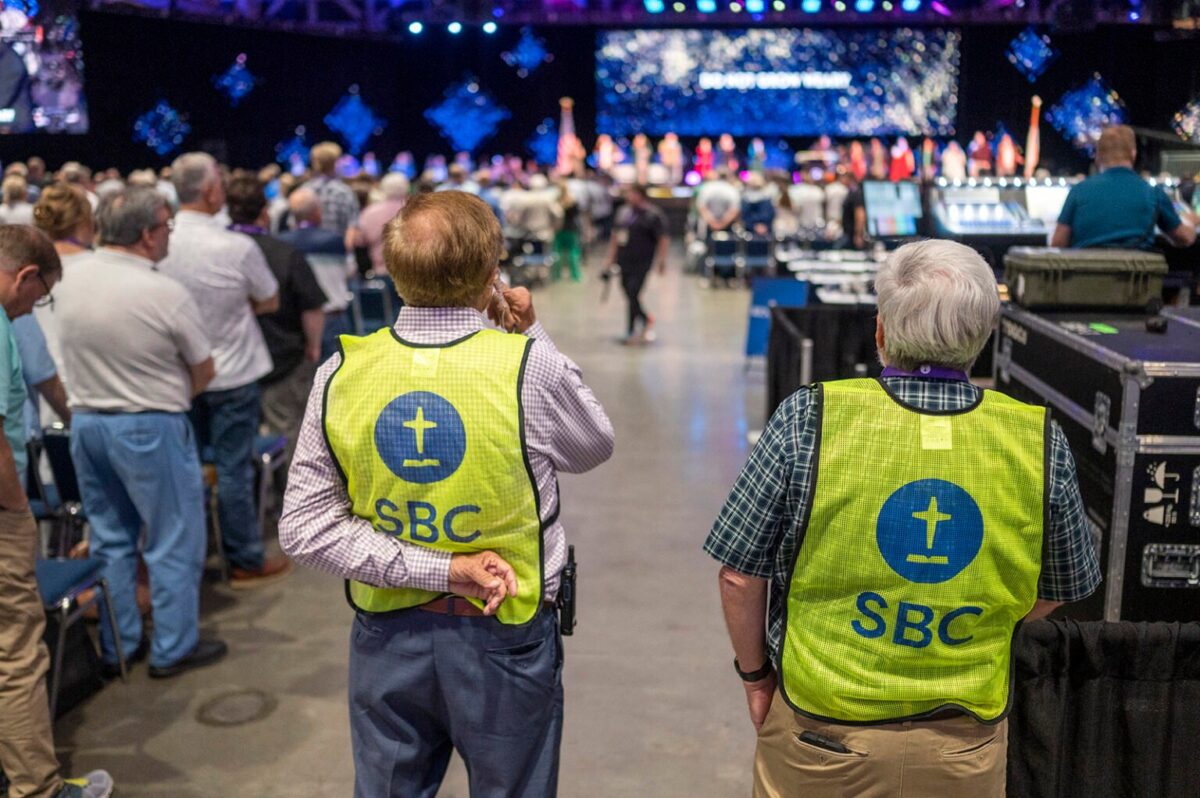
(RNS) — Put two Southern Baptists in the same room and before long they’ll find something to fight about.
For most of their history, members of the denomination have fought over the Bible, politics, race, sex, gender roles, music, dancing, Calvinism, and almost anything else they can think of.
All that feuding has overshadowed their surprising ability to work together. For nearly a century, the Southern Baptist Convention’s Cooperative Program — which pools money to fund missions, evangelism, and seminaries — has been a remarkable success, collecting more than $20 billion since 1925 and becoming the lifeblood of the nation’s largest Protestant denomination.
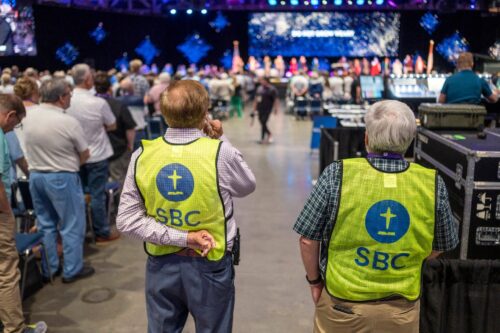
The Southern Baptist Convention annual meeting in the Ernest N. Morial Convention Center in New Orleans, Wednesday, June 14, 2023. (RNS photo/Emily Kask)
But as the Cooperative Program approaches its 100th anniversary in 2025, the trust that made the program possible has frayed. Southern Baptists have faced a sexual abuse crisis that has undermined confidence in denominational leaders. Feuds over politics, race, and the role of women in the church — which parallel the polarization of American culture — have dominated recent denominational meetings and caused some churches to withhold their mission giving.
More may follow suit, angered at a proposed rule change — known as the Law Amendment — that would bar churches with any women leaders who hold the title of pastor, whether they are a children’s pastor or a church’s senior pastor. Passing the amendment could lead hundreds of churches to be expelled or to leave because they disagree.
Not passing it could also lead to an exodus.
“We are going to lose some people regardless of what happens,” said Adam Wyatt, a Mississippi pastor and member of the SBC’s Executive Committee. “What does that mean long term? I don’t know.”
Whatever happens will likely affect the Cooperative Program, which is already facing pressures as churches have reduced the percentage of money they share with the denomination.
In the 1980s, SBC churches gave about 10% of their income to the Cooperative Program. Today, they give less than 5%, meaning national ministries like the SBC’s seminaries and mission boards — which get about a quarter and a third of their income from the Cooperative Program, respectively — have had to rely more on direct giving that bypasses the denomination.
For example, in fiscal year 1982, the SBC’s national entities received $102 million from the Cooperative Program, or the equivalent of more than $300 million today, when adjusted for inflation. In fiscal year 2022 — reported in the SBC’s 2023 annual report — those entities received $195.9 million from the Cooperative Program.
Giving to the Cooperative Program for this year is currently down about 2% — and 3.6% under budget, according to the SBC Executive Committee.
The number of Southern Baptists has also declined significantly over the past two decades, from a high of 16.3 million members in 2006 to 13.2 million members in 2023. That decline includes nearly half a million members from 2022 to 2023 and 1.5 million since 2018. Fewer members means fewer givers.
The number of churches giving to the Cooperative Program has declined in recent decades. In the mid-2000s, about three-quarters of churches gave to the program. Today, less than 60% give, according to data from the Executive Committee.
Denominational loyalty is also at a low, said Thom Rainer, founder of ChurchesAnswers.com and former CEO of Lifeway Christian Resources, the SBC’s publishing house. Rainer said the loss of confidence in denominations is part of a larger societal distrust of institutional leaders, which has an impact on denominational funding.
“If you don’t trust the leadership — you are not going to trust the funding model,” he said.
The SBC’s Executive Committee is meeting this week in Nashville to set the Cooperative Program budget for 2024 — which will be voted on at the denomination’s annual meeting this summer. They’ll do so while not knowing what the outcome of the vote on the Law Amendment will be. They’ll also have to deal with the Executive Committee finances — which have been under stress due to legal costs related to sex abuse lawsuits as well as discussing options to permanently fund a series of abuse reforms.
Some churches, like New Song Fellowship in Virginia Beach, have already had enough of the Cooperative Program. Last month, New Song ended its giving to the Cooperative Program in protest of an amicus brief filed by the Executive Committee and other SBC entities in a Kentucky sex abuse case. The lawsuit in question was over whether a change to the Kentucky statute of limitations in abuse cases would allow third parties like churches or schools to be sued for past abuse.
Brent Hobbs, New Song’s pastor, said the church already had concerns about the SBC before the brief was filed. The amicus brief, which was denounced by abuse survivors and surprised SBC leaders working on reforms, pushed them over the edge.
Hobbs said the SBC lacks leadership on a national level — and that means churches no longer trust those national leaders to do the right thing on abuse or other issues.
“We have to do the right thing or it is not worth keeping together,” he said.
Steve Bezner, pastor of Houston Northwest Church in Houston, Texas, said his congregation still gives to the Cooperative Program as well as to the Lottie Christmas Offering, an annual appeal that supports the SBC International Mission Board.
While entities like the IMB can accept donations directly from churches — in general they are barred from making direct appeals, which are seen as competing with the Cooperative Program. The Lottie Moon offering, and the annual Annie Armstrong Easter offering that benefits the North American Mission Board — are two exceptions to that rule. (Both are named after famed Southern Baptist women leaders.)
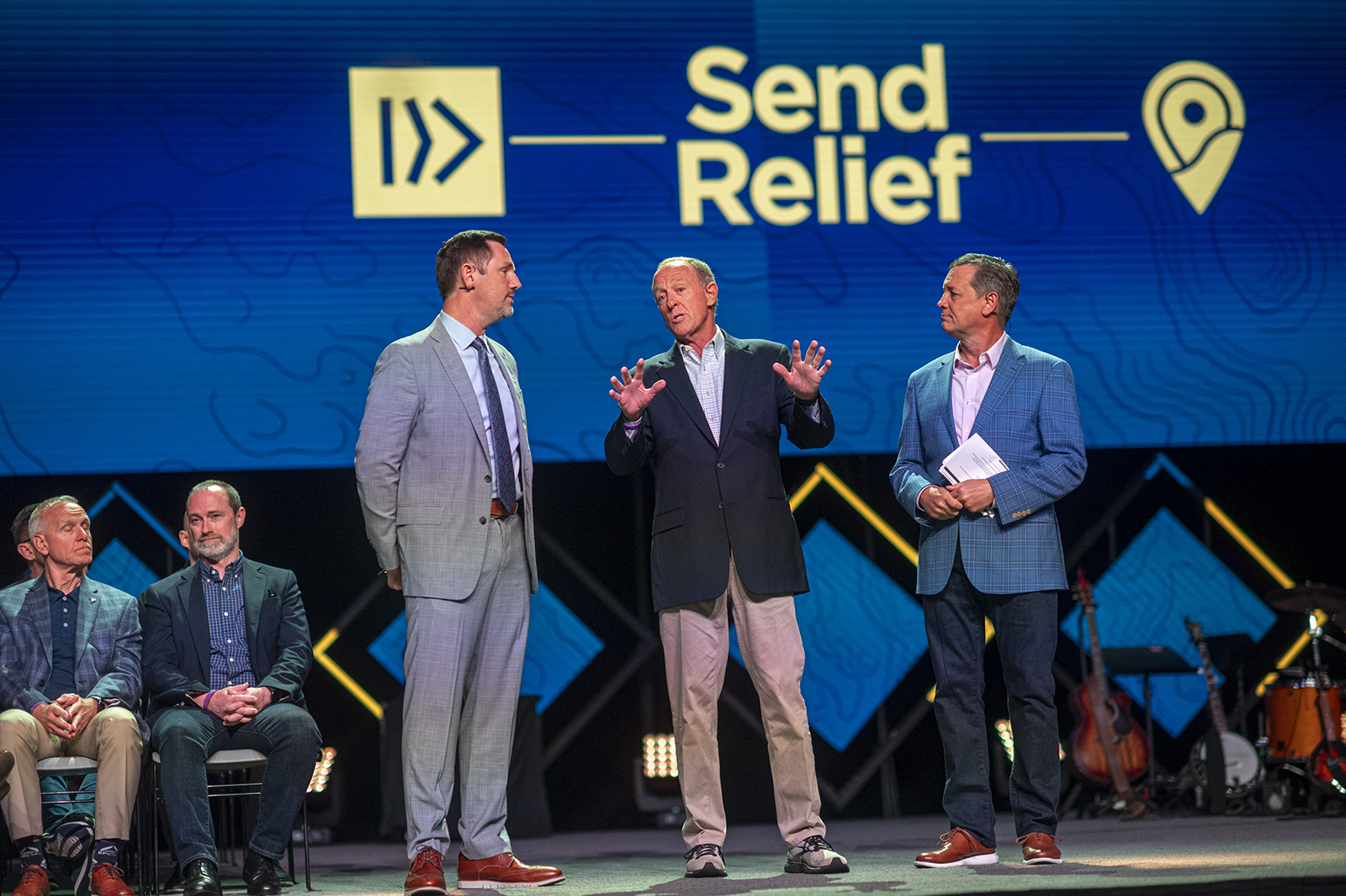
Paul Chitwood, from left, president of the International Mission Board, Bryant Wright, president of Send Relief, and Kevin Ezell, president of the North American Mission Board, at the Southern Baptist Convention annual meeting at the Ernst Morial Convention Center in New Orleans, La., on June 13, 2023. (RNS photo/Emily Kask)
Some of their Cooperative Program giving goes to support ministry in the state of Texas — funding things like humanitarian work at the border, student ministry and disaster relief. Under the program, churches send their donations to their state conventions. Those conventions then forward 42% of those funds to the Executive Committee.
Bezner suspects the future of the Cooperative Program will be determined during the SBC’s annual meeting, set for June 11-12 in Indianapolis.
“Lines of cooperation and lines of division will be drawn,” he said. “People will respond accordingly.”
Chris Kennedy, chief advancement officer for the IMB, said the agency currently gets about a third of its funding from the Cooperative Program — currently about $100 million a year.
“And as cooperative program declines, which it has consistently for a number of years, that requires more dependency on offerings like Lottie Moon,” he said. “It’s definitely a point of concern.”
When churches have decided to give directly to the IMB, rather than the Cooperative Program — that can have unintended consequences, said Kennedy. The program, he said, supports the seminaries that train many of the IMB missionaries. Less funding for seminaries could mean fewer missionaries. Giving directly to the IMB could end up undermining a church’s good intentions, he said.
Replacing Cooperative Program funding would be difficult if the program declines. But something more than money would be lost if churches stopped participating and the program collapsed, said Kennedy.
“The cooperative program is one of the most beautiful mission programs out there,” he said. “Grieving the loss of something like that would take a toll on our denominational soul in so many ways that we would struggle to recover from.”
Currently, about two-thirds of the Cooperative Program funds go to the International Mission Board (50.41%) and the North American Mission Board (11.79%), while almost a quarter (22.16%) goes to the SBC’s six seminaries. About 3% goes to the Executive Committee (2.99%) while less than 2% goes to the Ethics and Religious Liberty Commission (1.65%).
A proposal to use Cooperative Programs to fund abuse reforms was shot down in 2022. Currently, the reforms are being funded by money set aside by the two mission boards. No permanent plan is in place.
The SBC’s Executive Committee is also facing a financial squeeze, largely due to a series of lawsuits related to abuse reform that have led to “unsustainable” legal expenses, according to the group’s auditor. Last fall, the committee laid off five staffers and two contractors to cut expenses.
Malcolm Yarnell, a professor of theology at Southwestern Baptist Theological Seminary in Fort Worth, said the Cooperative Program will have to adapt. But it is unlikely to go away, he said, in large part because churches have written it in their budgets for years and may be reluctant to change that.
“There will be noticeable change,” he said. “But it will not be cataclysmic change.”
Overseeing the Cooperative Program money collected by the Executive Committee also has become complicated, said Yarnell. While SBC entities depend on those funds, they are also fiercely independent.
“The entities don’t necessarily like to see themselves as responsible to the executive committee,” he said. “It’s a very delicate dance of a relationship.”
Any permanent funding for abuse reforms or assistance for the Executive Committee will need the cooperation of the SBC’s entity heads.
During a question and answer session at First Baptist Church in Jacksonville, Florida, SBC President Bart Barber was asked if the SBC was facing a financial crisis because of sexual abuse lawsuits against it.
He said no.
However, he said, the SBC’s legal costs are rising because of those lawsuits — and that those costs were being borne by the Executive Committee, which runs on a shoestring budget, as Southern Baptists have always tried to send as much money as they can to missions.
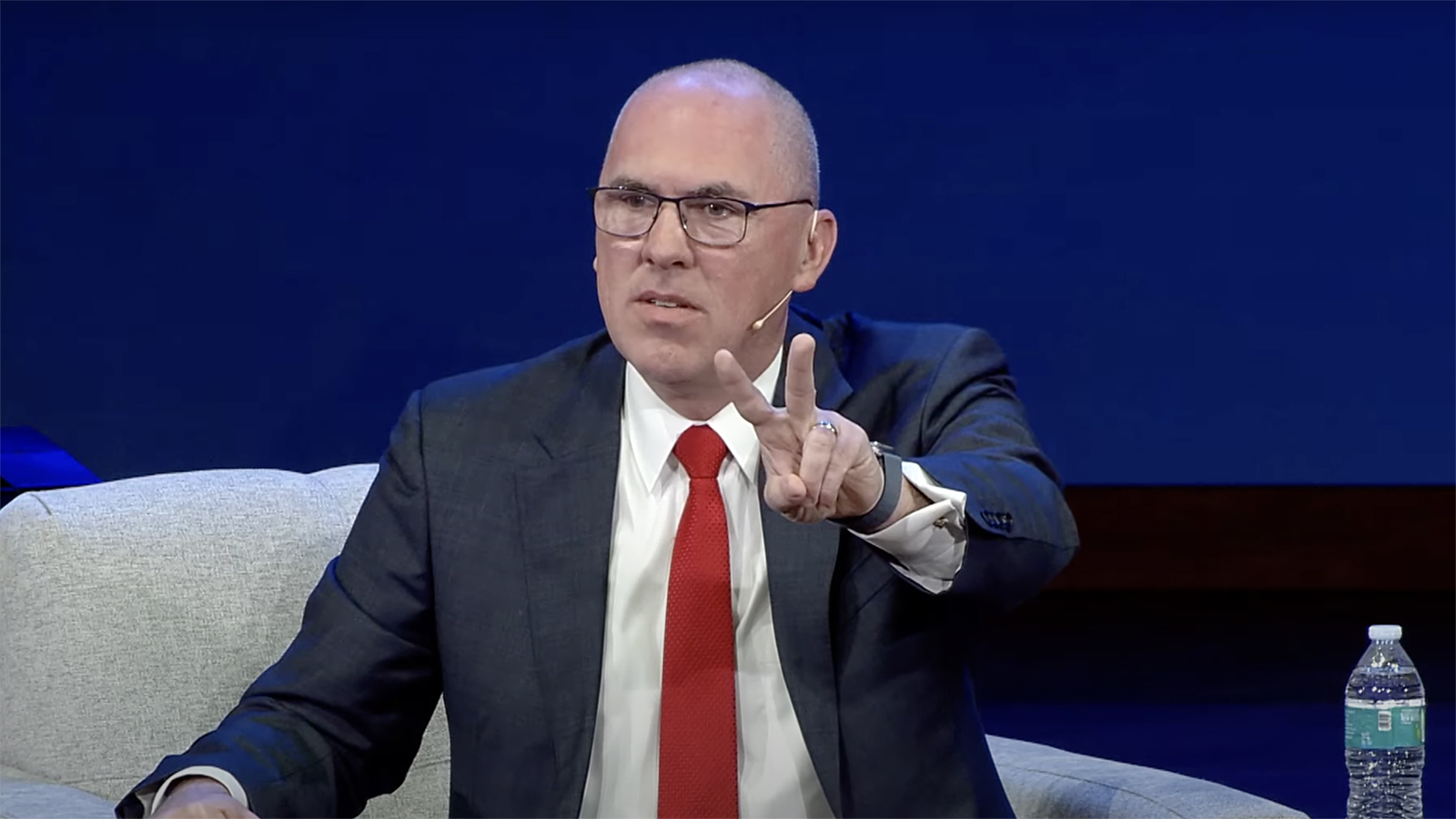
SBC President Bart Barber speaks at First Baptist Church in Jacksonville, Florida. (Video screen grab)
“They are feeling the financial pinch right now,” he said. “But Southern Baptists are not out of money, and Southern Baptists are not anywhere close to being out of money.”
Barber, a Texas pastor whose second term in office expires in June, said leaders are trying to be wise in how money is spent. He also said lawyers and legal fees are part of the costs needed to run the SBC and do mission work.
“So the decisions that we’re going to face are not decisions about whether we have enough money to continue to operate,” he said. “The decisions we’re going to face are how to allocate our money to be able to cover the things that we need to do.”
In a follow-up interview with RNS, Barber said the SBC churches have enough money to fund their shared ministries. And he was optimistic about the denomination’s future, saying the Cooperative will make its 100th anniversary and beyond.
“Yes, it is going to survive for another 100 years,” he said. “I would not contemplate otherwise.”
(This story has been updated.)





